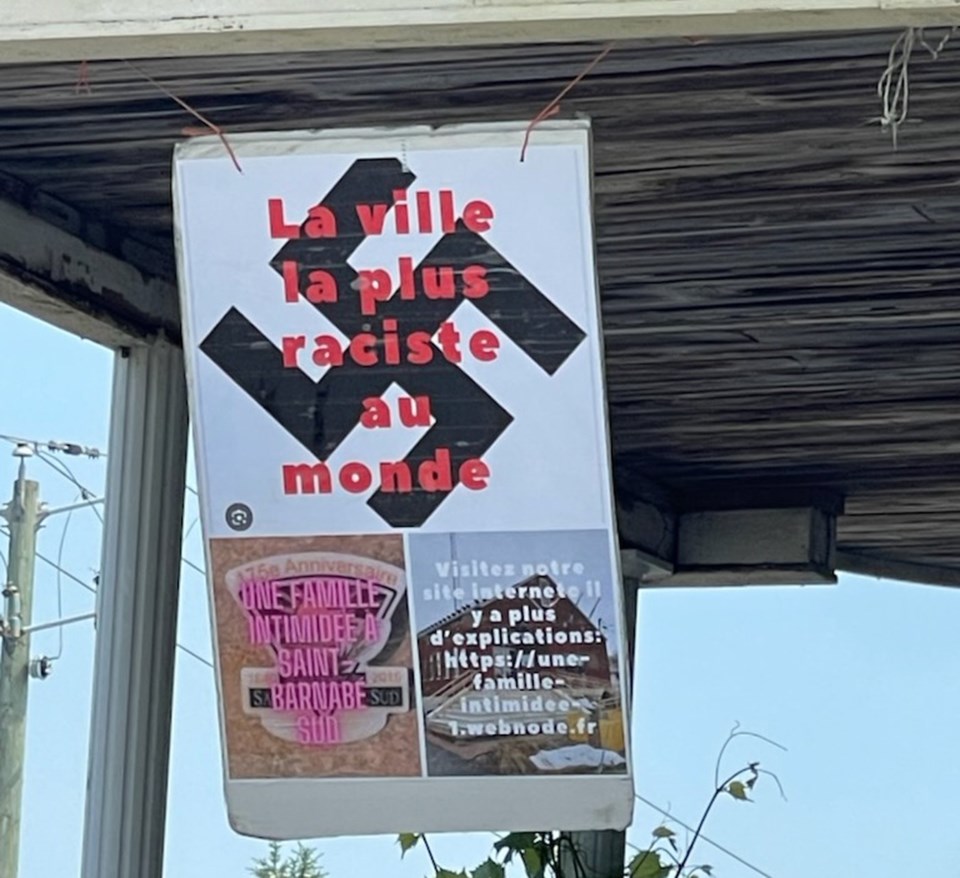MONTREAL — A small Quebec community has been locked in a drawn-out battle for the last two years with a local family that accuses it of being “the most racist city in the world.”
Last month, a Quebec Superior Court judge ordered Yahia Meddah to take down signs featuring swastikas that he had hung on his property in the municipality of St-Barnabé-Sud, a community of roughly 1,000 people northeast of Montreal.
The signs accused the municipality of racism and directed people to visit a website describing how his family had been intimidated by the local government.
Linda Normandeau, director general of the municipality, said the community was shocked by the appearance of the Nazi symbol, and had no choice but to seek a court order to get the signs removed.
“I have the impression that the community has literally been taken hostage,” she said. “We’ve had something totally unacceptable, shocking and disturbing imposed on us by a citizen.”
St-Barnabé-Sud is a welcoming community, but the ongoing conflict with Meddah and his family has been costly and time-consuming, she said. Normandeau hopes to seek recourse from a new Quebec law that allows for fines against people who harass elected officials.
Meddah claims Normandeau is intent on forcing his family out of the community. "We are living a nightmare," he said.
Meddah said his family has lived in St-Barnabé-Sud for 15 years, but had no problems until recently. The relationship with the municipality soured in the fall of 2022, after the local government heard complaints that the family was operating a generator indoors.
The municipality ordered an emergency inspection that revealed the presence of a generator, a barbecue and propane tanks inside the building, which was not equipped with smoke or carbon monoxide detectors, according to Superior Court documents. Meddah told The Canadian Press that the inspectors broke down his door and terrified his children. He said there are 11 people living on the property, including four minors.
When inspectors went back in February 2023, according to court documents, Meddah wouldn’t let them in and instead told them to speak to his lawyer and come back with a warrant.
So began a protracted legal battle. The municipality sought the right to conduct a followup inspection, while Meddah accused Normandeau of harassment and discrimination.
In a June 7 decision, Justice J. Sébastien Vaillancourt ruled that St-Barnabé-Sud “clearly” had the right to inspect the premises, and that the allegations of discrimination “are in no way supported by the evidence.”
“This case has taken on a scale that it never should have,” Vaillancourt wrote.
Shortly after the June ruling, Normandeau said, the swastikas appeared on Meddah’s property. A photo of one of the signs shows a black swastika overlaid with red lettering that reads “the most racist city in the world.”
Meddah also launched a website listing his grievances against Normandeau and the local government. Normandeau said the website host took it down, but Meddah quickly launched another, which was also shut down. Another website is still active, alleging that the family is the victim of "direct and personal attacks" from the municipality.
"Leave us in peace," Meddah said. "Let us live."
Normandeau said she asked police to intervene regarding the swastikas, but was told they could not since Canada does not have an explicit ban on the display of the Nazi symbol.
“People were very, very shocked when the swastikas appeared,” Normandeau said. “I think they should be banned.”
The municipality went back to court to request a temporary injunction, which was granted on June 25. Normandeau said the swastikas have since been removed, though other signs have taken their place. The municipality is waiting for another court date to extend the injunction against the swastikas, but she hopes to resolve the issue out of court, she said.
The whole affair has already cost the municipality tens of thousands of dollars, Normandeau said. “For a small community, this has taken up a lot of resources.”
She said she hopes St-Barnabé-Sud might be able to benefit from a new Quebec law, passed last month, that includes fines of up to $1,500 for anyone who harasses an elected official. The provincial police force also has an action plan to fight the intimidation of elected officials and municipal managers.
As director general, Normandeau has not been elected. But she said people in her position also need protection. “I am the person responsible for civil security,” she said. “We’re on the front lines.”
This report by The Canadian Press was first published July 10, 2024.
Maura Forrest, The Canadian Press


